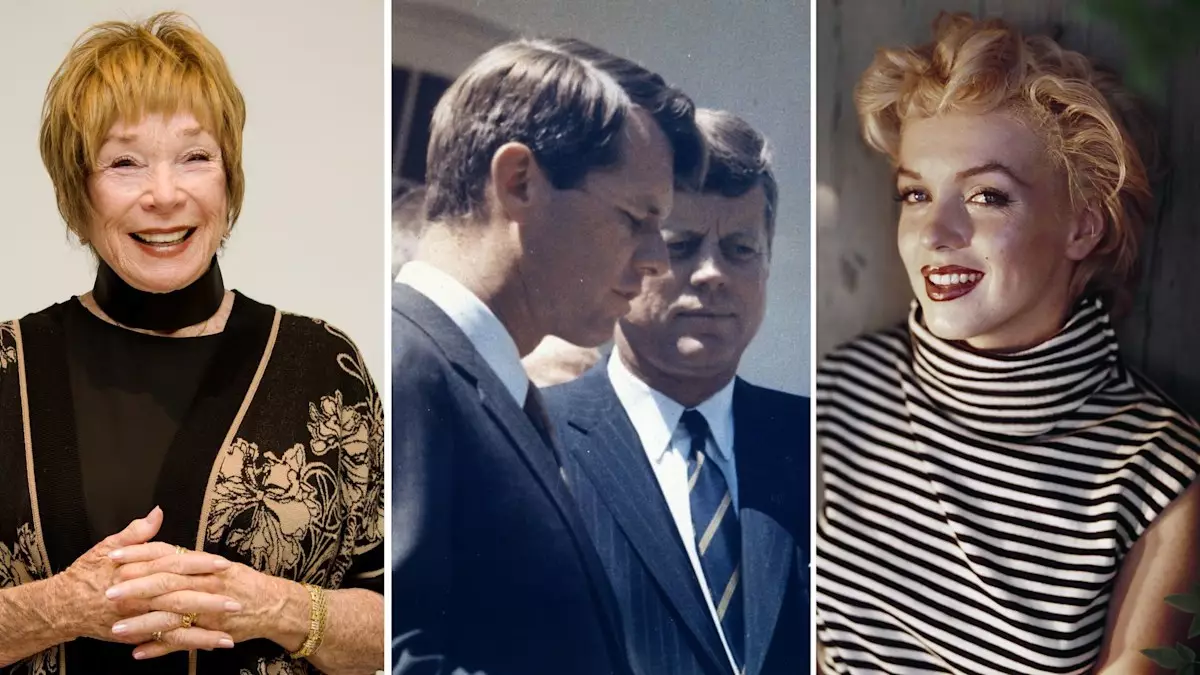Hollywood has always had its share of scandals and unheard stories, and the recent disclosure by actress Shirley MacLaine only adds to the mythos that surrounds the figures of Marilyn Monroe and the Kennedy family. In her latest coffee table book, *The Wall of Life: Pictures and Stories from this Marvelous Lifetime*, MacLaine presents a claim that reframes our understanding of the connections between these iconic personalities of the 1960s. The assertion that Marilyn Monroe, an emblem of beauty and tragedy, had a relationship not only with President John F. Kennedy but also with his brother Bobby Kennedy, marks a significant addition to the Hollywood lore entwined with American political history.
The Enigmatic Evening
The heart of MacLaine’s revelation lies in the celebrations surrounding John F. Kennedy’s 45th birthday in May 1962, where Monroe’s sultry rendition of “Happy Birthday” stunned onlookers and solidified her image as a provocateur. MacLaine recalls a private moment after the public gala, where she witnessed JFK leave the bedroom of Marilyn Monroe, only to have Bobby enter shortly thereafter. This revelation prompts a reconsideration of both the personal lives of the Kennedy brothers and Monroe’s influence—an intersection of politics and celebrity that has long captivated historians and fans alike.
MacLaine’s account suggests a casual yet impactful environment wherein such encounters were normalized. The fact that she shared this moment with the late Ted Kennedy years later, laughing about the escapades of his brothers, offers a tantalizing glimpse into familial camaraderie amidst public scandal. It’s not just a story about infidelity; rather, it reveals a culture of secrecy and discretion—a reality for many public figures trying to navigate the unrelenting gaze of fame.
MacLaine’s narrative around that night in 1962 raises questions about how personal relationships interweave with public personas in Hollywood and politics. Following Monroe’s sultry birthday rendition, the affair with JFK reportedly weighed heavily on his marriage to Jackie Kennedy, leading to choices that would haunt the First Family. The turmoil ensuing from these relationships provides a case study on how celebrity and political lives affect—and are affected by—each other.
The looming tragedies of these iconic figures heighten the drama of the narrative. Monroe’s untimely death only months later and the subsequent assassinations of Bobby and John Kennedy serve as somber reminders of the precariousness of life and love in the public eye. The intertwining of their lives and fates illustrates how fame can be both a spotlight and a snare.
In sharing her life experiences and insights in *The Wall of Life*, MacLaine is doing much more than recounting stories; she plays the role of historian and cultural commentator. By using her platform to explore her relationships with figures like Monroe and the Kennedys, she gains deeper significance as both a participant in and observer of Hollywood history. This shift in focus from spirituality, as evident in MacLaine’s previous writings, to the more secular and scandalous aspects of her experiences marks an evolution in her narrative style.
Furthermore, her candidness about her interactions with other Hollywood icons, including Morgan Freeman and Jack Nicholson, indicates her willingness to bare both her triumphs and disappointments. This reflection cultivates a sense of authenticity that resonates in a world increasingly obsessed with celebrity culture.
As MacLaine sets the stage for continued exploration of these storied lives, one cannot help but ponder the influence of Monroe’s connection with the Kennedys on American culture. The amalgamation of beauty, power, and tragedy creates an evocative legacy that endures in popular consciousness. MacLaine’s insights not only add depth to our understanding of these relationships but also remind us that the line between public persona and private life is often blurred in the sphere of fame.
With *The Wall of Life*, MacLaine presents a uniquely personal take on significant events and figures in history, ensuring the stories of icons like Monroe and the Kennedys remain not merely as fleeting moments in time, but as profound lessons in human relationships—both benevolent and tumultuous. Ultimately, these revelations provide a lens through which to view the complexities of fame and intimacy, an exploration that will endure long after the last page is turned.

